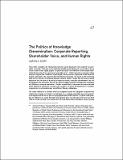| dc.contributor.author |
Aaron A. Dhir |
| dc.coverage.spatial |
United States |
| dc.date.accessioned |
2016-01-07T15:20:39Z |
| dc.date.available |
2016-01-07T15:20:39Z |
| dc.identifier.uri |
http://desa1.cejamericas.org:8080/handle/2015/411 |
| dc.description.abstract |
This article considers the relationship between social disclosure and corporate accountability in Canada. It focuses on the potential benefits social disclosure can provide in terms of the overall human rights project. I explore this issue with reference to the broader theoretical frameworks of new governance and reflexive law. While I ground my analysis in these analytical approaches, I distance myself slightly from particular arguments in the literature to date: specifically, the argument that the disclosure process will result in self-correcting behavior on the part of corporate decision makers. Rather, I argue that the value of social disclosure may lie more in its ability to empower socially conscious shareholders who will be equipped with information that can be used to engage corporate management in dialogue and influence corporate operations. I further contend that a movement towards enhanced social disclosure should be viewed as the corollary of recent developments in Canadian corporate law involving directors’ and officers’ fiduciary obligations. |
| dc.language.iso |
English |
| dc.title |
The Politics of Knowledge Dissemination: Corporate Reporting, Shareholder Voice, and Human Rights |
| dc.ceja.source |
Fuente: Osgoode Hall Law Journal |

